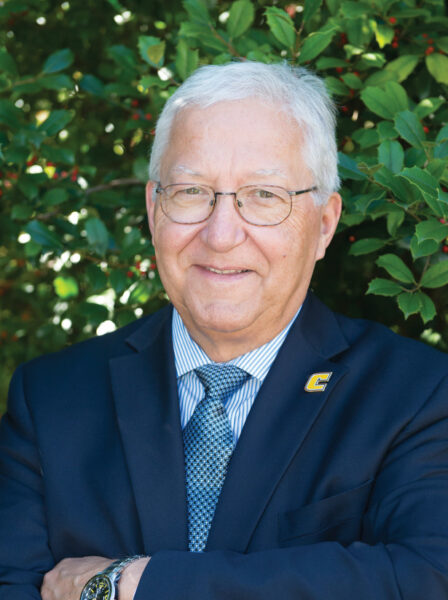 By Doug Adams, Associate Provost, Office of Research, Vanderbilt University and Reinhold Mann, Deputy Vice Chancellor for Research, University of Tennessee, Chattanooga
By Doug Adams, Associate Provost, Office of Research, Vanderbilt University and Reinhold Mann, Deputy Vice Chancellor for Research, University of Tennessee, Chattanooga
Tennessee institutions are leading the efforts in use-inspired innovation to tackle challenges in safety, mobility, decarbonizing transportation and intelligent traffic management systems.
For example, Vanderbilt researchers are working with partners across the state to tackle phantom traffic jams using new automated vehicle technologies. Researchers implement these technologies to manage traffic on one of the most congested corridors in Tennessee while also working to improve the end-to-end efficiency of public transportation and emergency response systems.
Meanwhile, many of the University of Tennessee Chattanooga’s efforts to innovate start with specific challenges for which new uses and advancements of methods and technologies can make a significant difference. In the transportation area, UTC is using traffic accident data in the city and region in order to tailor artificial intelligence approaches and methods to make predictions about accident hotspots during certain times and under certain environmental conditions.
 Decarbonization of transportation and mobility is a huge challenge. On the path to this effort, any reduction of carbon emissions will have an impact on quality of life and on the economic state of Tennessee. There is a massive opportunity for better, safer mobility for all: connecting home to work, leisure, grocery stores and more. If cars, trucks, public transportation, and the freight fleet are electrified it will improve air quality and, in general, reduce the vehicle operational and lifecycle costs for consumers.
Decarbonization of transportation and mobility is a huge challenge. On the path to this effort, any reduction of carbon emissions will have an impact on quality of life and on the economic state of Tennessee. There is a massive opportunity for better, safer mobility for all: connecting home to work, leisure, grocery stores and more. If cars, trucks, public transportation, and the freight fleet are electrified it will improve air quality and, in general, reduce the vehicle operational and lifecycle costs for consumers.
Critical infrastructure components
Partnerships with local communities — so that we understand their needs and aspirations — are a key ingredient to developing smart mobility solutions. Data is also a key ingredient because you can’t reliably improve what you can’t measure. Emerging technologies for addressing our biggest challenges in mobility, including the challenges relating to EVs, require that we use data to make informed decisions.
State-of-the-art networking, communications and computation, resiliency to adverse environmental events, cybersecurity and supporting real-time decision making are critical components of the infrastructure that will spur Tennessee’s smart mobility solutions.
A database showcasing the state’s mobility resources would massively drive Tennessee’s mobility solutions by providing awareness to stakeholders. It’s only by collaborating that we will meet the challenges today and upscale the next generation who will tackle the challenges of automotive innovation.
Statewide EV partners
Transit agencies have been among the first to adopt EVs. For example, the Chattanooga Area Regional Transportation Authority started working on electrified vehicles in the 1990s. Partnering with groups like CARTA will ensure that transportation services are made accessible and available to all.
Automotive companies that are making a home in Tennessee – General Motors, Ford, Nissan and Volkswagen to name a few – are also key partners, because they can enable innovation for individual vehicles as well as for car share services to advance the future of transportation. A partnership with electrical utilities and, in particular, the Tennessee Valley Authority, is essential as well because they are preparing for the loads to the power grid that will arrive as more drivers adopt EVs in Tennessee.
Vanderbilt is driving innovation in the workforce in areas like automotive manufacturing and electrification by partnering with IACMI- The Composites Institute to make cars and trucks lighter, stronger and more energy efficient using advanced composite materials and to train the manufacturing workforce in the use of these materials.
Vanderbilt and UTC are working with TDOT and City of Chattanooga on two testbeds, urban and highway to demonstrate the possibilities of transportation efficiency at city scale. UTC has been working with colleagues at EPB, City of Chattanooga, Hamilton County, CARTA, TVA, ORNL, VW, and others to support the state’s EV evolution.
Tennessee’s return on investment
The partnership between Vanderbilt and CARTA is demonstrating the return on investment that is possible using smart mobility solutions. Vanderbilt is working on the final deployments of the technology, but the initial projections have shown that with strategic operations Vanderbilt can serve the same number of people but save 576 metric tonnes of CO2 emissions annually, while also saving $150,000 for the transportation agency in a given year.
Additionally, Volkswagen’s decision to make Chattanooga its home for its North American Battery Engineering Lab not only situates Tennessee’s as an epicenter for innovation, but provides about 4,000 jobs to Tennesseans.
More recently, NOVONIX, a battery production company, celebrated the groundbreaking of its new facility on Riverfront Parkway in Chattanooga in November 2021. This $160 million investment is expected to create 290 new jobs in Hamilton County. NOVONIX is also partnering with Hamilton County schools through the new Future Ready Institute for advanced battery technology.
Statewide impact
Smart and data-driven mobility technologies on Tennessee roadways will help to move more people and goods while reducing traffic congestion and motor vehicle accidents.
Education, along with attracting and developing the talent and workforce, draws economic benefits to the region and elevates the overall quality of life for all Tennesseans. Investing in these technologies, solutions and strategies increases opportunities for innovation and entrepreneurship development in our state. There are significant opportunities to coordinate, collaborate in order to make the whole enterprise more than the sum of its parts.
Sign up for TAEBC’s newsletter to learn more about our members, advanced energy news and upcoming events. Or, if you’re not already a member, become a member today!
